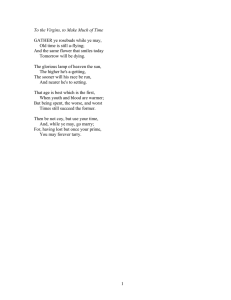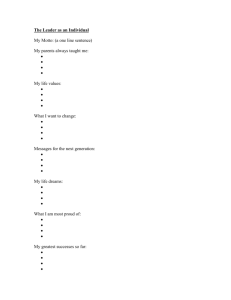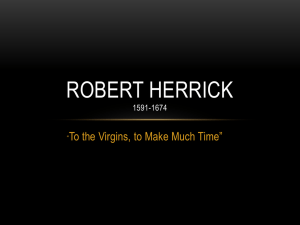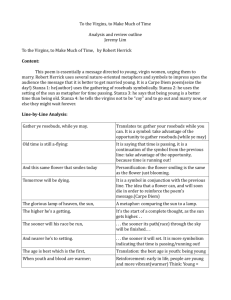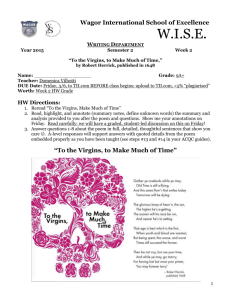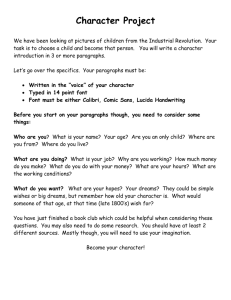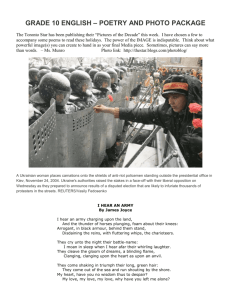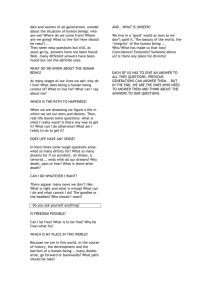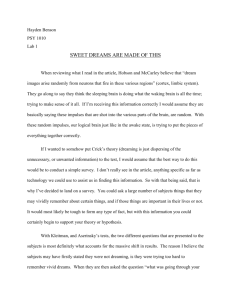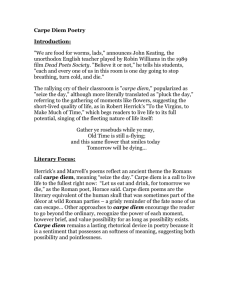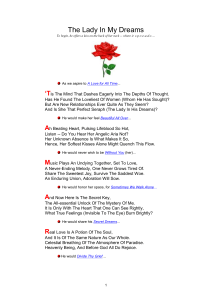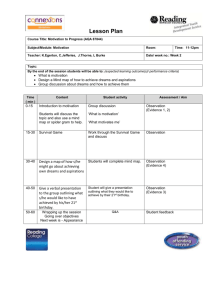Carpe Diem Poems: Seize the Day Anthology
advertisement
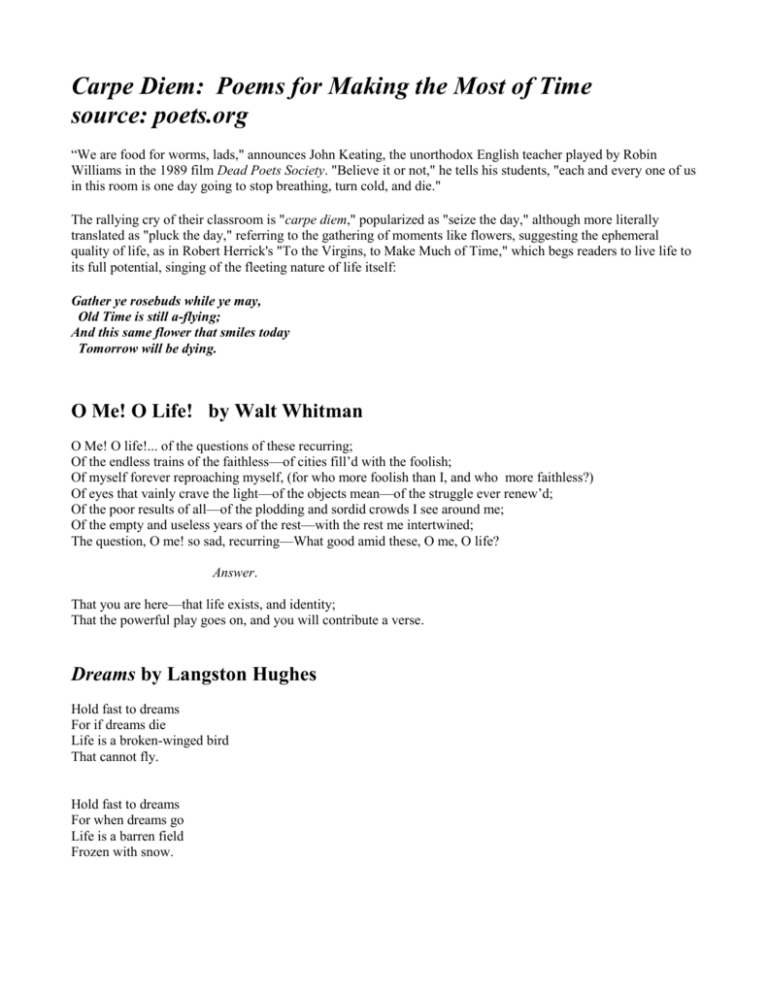
Carpe Diem: Poems for Making the Most of Time source: poets.org “We are food for worms, lads," announces John Keating, the unorthodox English teacher played by Robin Williams in the 1989 film Dead Poets Society. "Believe it or not," he tells his students, "each and every one of us in this room is one day going to stop breathing, turn cold, and die." The rallying cry of their classroom is "carpe diem," popularized as "seize the day," although more literally translated as "pluck the day," referring to the gathering of moments like flowers, suggesting the ephemeral quality of life, as in Robert Herrick's "To the Virgins, to Make Much of Time," which begs readers to live life to its full potential, singing of the fleeting nature of life itself: Gather ye rosebuds while ye may, Old Time is still a-flying; And this same flower that smiles today Tomorrow will be dying. O Me! O Life! by Walt Whitman O Me! O life!... of the questions of these recurring; Of the endless trains of the faithless—of cities fill’d with the foolish; Of myself forever reproaching myself, (for who more foolish than I, and who more faithless?) Of eyes that vainly crave the light—of the objects mean—of the struggle ever renew’d; Of the poor results of all—of the plodding and sordid crowds I see around me; Of the empty and useless years of the rest—with the rest me intertwined; The question, O me! so sad, recurring—What good amid these, O me, O life? Answer. That you are here—that life exists, and identity; That the powerful play goes on, and you will contribute a verse. Dreams by Langston Hughes Hold fast to dreams For if dreams die Life is a broken-winged bird That cannot fly. Hold fast to dreams For when dreams go Life is a barren field Frozen with snow. The Road Not Taken by Robert Frost Two roads diverged in a yellow wood, And sorry I could not travel both And be one traveler, long I stood And looked down one as far as I could To where it bent in the undergrowth; Then took the other, as just as fair, And having perhaps the better claim, Because it was grassy and wanted wear; Though as for that the passing there Had worn them really about the same, And both that morning equally lay In leaves no step had trodden black. Oh, I kept the first for another day! Yet knowing how way leads on to way, I doubted if I should ever come back. I shall be telling this with a sigh Somewhere ages and ages hence: Two roads diverged in a wood, and I— I took the one less traveled by, And that has made all the difference. To the Virgins, to Make Much of Time by Robert Herrick Gather ye rosebuds while ye may, Old Time is still a-flying; And this same flower that smiles today Tomorrow will be dying. The glorious lamp of heaven, the sun, The higher he's a-getting, The sooner will his race be run, And nearer he's to setting. That age is best which is the first, When youth and blood are warmer; But being spent, the worse, and worst Times still succeed the former. Then be not coy, but use your time, And while ye may, go marry; For having lost but once your prime, You may forever tarry. The Layers by Stanley Kunitz I have walked through many lives, some of them my own, and I am not who I was, though some principle of being abides, from which I struggle not to stray. When I look behind, as I am compelled to look before I can gather strength to proceed on my journey, I see the milestones dwindling toward the horizon and the slow fires trailing from the abandoned camp-sites, over which scavenger angels wheel on heavy wings. Oh, I have made myself a tribe out of my true affections, and my tribe is scattered! How shall the heart be reconciled to its feast of losses? In a rising wind the manic dust of my friends, those who fell along the way, bitterly stings my face. Yet I turn, I turn, exulting somewhat, with my will intact to go wherever I need to go, and every stone on the road precious to me. In my darkest night, when the moon was covered and I roamed through wreckage, a nimbus-clouded voice directed me: "Live in the layers, not on the litter." Though I lack the art to decipher it, no doubt the next chapter in my book of transformations is already written. I am not done with my changes. A Song On the End of the World by Czeslaw Milosz Translated by Anthony Milosz On the day the world ends A bee circles a clover, A fisherman mends a glimmering net. Happy porpoises jump in the sea, By the rainspout young sparrows are playing And the snake is gold-skinned as it should always be. On the day the world ends Women walk through the fields under their umbrellas, A drunkard grows sleepy at the edge of a lawn, Vegetable peddlers shout in the street And a yellow-sailed boat comes nearer the island, The voice of a violin lasts in the air And leads into a starry night. And those who expected lightning and thunder Are disappointed. And those who expected signs and archangels' trumps Do not believe it is happening now. As long as the sun and the moon are above, As long as the bumblebee visits a rose, As long as rosy infants are born No one believes it is happening now. Only a white-haired old man, who would be a prophet Yet is not a prophet, for he's much too busy, Repeats while he binds his tomatoes: No other end of the world will there be, No other end of the world will there be.
